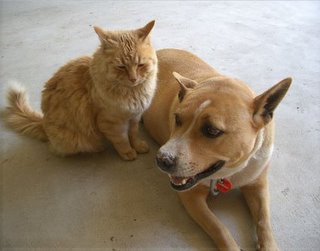BAN Dog and Cat Fur
I'm sure we've all seen them, but never given a second thought to what they were made of. I personally didn't think they were actually made from real fur and now the thought discusts me. I've bought catnip mice that seem so life like...now I wonder, did they come from man's best friends? A kitty toy made from real kitty? Before I buy another item, I'm going to have to see proof that it's synthetic. There is a Petition at Pitbulljungle Blog where you can add your name. Please show your support against this appalling practice.
Best Friends Forever:
Ban the Use of Dog and Cat Fur Says the Humane Society of Canada .
“… More than 15 million pets are ‘just one of the family’ in every community across Canada. If through a simple act of kindness, you have been rewarded by a contented purr, the gentle nuzzle of a cold nose, or listened to the gentle beat of their heart, then you know exactly what I’m talking about …” Michael O’Sullivan, Chairman & CEO, The Humane Society of Canada.
December 16, VANCOUVER - With the growing number of fur items being imported from China, The Humane Society of Canada is urging the federal government to following the example of other countries in banning the import of dog and cat fur. In the United States, The Dog and Cat Protection Act of 2000 banned such imports with fines as high as $11,580 (US $10,000), and the 25 countries of the European Union are considering passing a similar law. Undercover investigations have documented the cruel slaughter of dogs and cats in China, and a recent report alleges that this practice may also be taking place in the Czech Republic. Our undercover team purchased these miniature versions of dogs and cats which ranged in price from $2.99 to $7.99 (US $2.58 to US $6.90) and the sellers admitted the goods were imported from China. One store owner told us the items were made from feathers (clearly not the case), and another was vague and evasive about the type of fur used in its manufacture. Dog and cat fur is also used for trim in the manufacture of clothing, scarves, gloves and other accessories.
Our undercover team purchased these miniature versions of dogs and cats which ranged in price from $2.99 to $7.99 (US $2.58 to US $6.90) and the sellers admitted the goods were imported from China. One store owner told us the items were made from feathers (clearly not the case), and another was vague and evasive about the type of fur used in its manufacture. Dog and cat fur is also used for trim in the manufacture of clothing, scarves, gloves and other accessories.
The willingness of the Chinese Government to distort the truth is once more underscored by the toxic spill that took place on December 13th of this year which affected the environment in China and downstream in Russian and the drinking water for more than 4 million people. For nearly a week after 100 tonnes of deadly benzene and nitrobenzene spilled into the Songhau River which in turn feeds into the Amur River in Russia, Chinese officials lied to their own people about the nature of the disaster.
The Canadian Government’s longstanding defence of Canada’s own fur trade and seal hunt means that politicians and civil servants have been reluctant to clamp down on this trade. China represents a huge consumer market for the business community at large, and as a result, many governments, including Canada, are unwilling to pick a fight with China over issues resulting in suffering for people and animals and damage to the environment.
This reluctance by Canadian politicians to take China to task for its failure to live up to its standing as a member of the international community is even more remarkable in the wake of SARS which was traced back to the horrific conditions in their wildlife markets; and avian bird flu which has also been traced back to the cruelty found in their animal markets. These two diseases alone caused enormous human and animal suffering and resulted in billions of dollars in lost revenues for the Canadian business community.
Government agencies in Canada also routinely fail to enforce the requirement that all imported goods bear labels identifying the country of origin and the materials used in the manufacture of each item. Even when labels are attached to the items exported from China there is no enforcement in that country to ensure that the information is truthful.
Forensic testing to determine the type of fur costs $100 per item (US $86) and there is a three month waiting period to get the results.
For more than 35 years, The Humane Society of Canada has worked in over 95 countries, and it has been our experience that no animal raised in captivity or killed in the wild ever suffers anything except a cruel death. Each year, the fur trade is directly responsible for the slaughter of tens of millions of dogs, cats, rabbits and wildlife.
Here’s how you can help with our consumer awareness campaign Best Friends Forever:
The best way to make sure your hard earned money doesn’t support this cruel trade is to make sure that you and your friends and family don’t buy fur of any kind
Many of these items are for sale in variety stores and import stores which are offering a wide range of other goods for sale. Ask to speak to the store owner or manager and politely tell him/her that until the fur items are removed from their shelves, you and your friends and family will be spending your money someplace else
Provide us with the name, address, telephone number and e mail address of any stores where you see these items for sale, so we can follow up with a letter of our own
Write to Prime Minister Stephen Harper, House of Commons, Ottawa, Ontario K1A 0A2 and tell him to do the right thing and join other civilized countries in passing a law to ban this cruel trade.
CONTACT: Al Hickey or Michael O'Sullivan by toll free 1-800-641-KIND or Michael on his cell phone (416) 876-9685 or at http://www.humanesociety.com/.
[For more than 17 years, Al Hickey was the Chief Executive of the BC SPCA and before that headed up the Alberta and BC Chambers of Commerce, and the Executive Director of the Boys and Girls Club of Greater Vancouver. He has 6 grandchildren.
A father with two children, and a houseful of dogs and cats, O'Sullivan has worked across Canada and in over 90 countries during the last 35 years helping people, animals and nature.]
The Humane Society of Canada works to protect dogs, cats, rabbits, birds, horses, livestock, lab animals, wildlife and the environment. We carry out hands on programs to help animals and nature, mount rescue operations, expose cruelty through hard hitting undercover investigations, work to pass laws to protect animals, fund non-invasive scientific research, support animal shelters and wildlife rehabilitation centres and spread the word about how to help animals and nature through humane education.
The Humane Society of Canada depends entirely on donations to support our programs to help animals and the environment. All donations are gratefully acknowledged with a receipt for income tax purposes. If you would like to support our educational campaigns please make a donation here.






























No comments:
Post a Comment